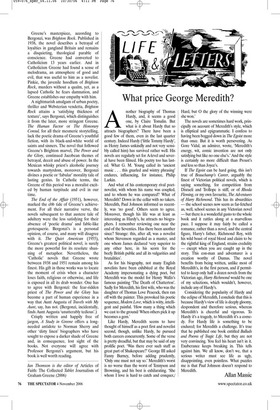What price George Meredith?
Another biography of Thomas Hardy, and, it seems a good one, by Claire Tomalin. But what is it about Hardy that so attracts biographers? There have been a good few of them, even in the last quarter century. Indeed Hardy (‘little Tommy Hardy’, as Henry James unkindly and not very sensibly called him) has survived rather well. His novels are regularly set for A-level and several have been filmed. His poetry too has lasted. What G. M. Young called its ‘ancient music . . . this gnarled and wintry phrasing’ endures, influencing, for instance, Philip Larkin.
And what of his contemporary rival poetnovelist, with whom his name was coupled, and to whom he was compared? What of Meredith? Down in the cellar with no takers. Meredith, Paul Johnson informed us recently, was ‘no good’. Others seem to agree. Moreover, though his life was at least as interesting as Hardy’s, he attracts no biographers. I remember reviewing one near the end of the Seventies. Has there been another since? Strange: this, after all, was a novelist whom Stevenson regarded as a master, and one whom James declared ‘very superior to any other here, in his scorn for the beefy British public and all its vulgarities and brutalities’.
As for his biography, not many English novelists have been exhibited at the Royal Academy impersonating a dying poet, but Meredith was the model for Henry Wallis’s famous painting ‘The Death of Chatterton’. Sadly for Meredith, his first wife, who was the daughter of Thomas Love Peacock, then ran off with the painter. This provoked his poetic sequence, Modern Love, which is witty, intelligent and painful. ‘How many a thing which we cast to the ground/ When others pick it up becomes a gem.’ Like Hardy, Meredith seems to have thought of himself as a poet first and novelist second, though, unlike Hardy, he pursued both careers concurrently. Some of the verse is pretty dreadful, but that may be said of any prolific poet. ‘Was there ever such stuff as great part of Shakespeare?’ George III asked Fanny Burney, before adding prudently, ‘Only one must not say so.’ Meredith’s worst is no worse than the worst of Tennyson and Browning, and his best is exhilarating. ‘She whom I love is hard to catch and conquer,/ Hard, but O the glory of the winning were she won.’ The novels are sometimes hard work, principally on account of Meredith’s style, which is elliptical and epigrammatic. I confess to having been bogged down in The Egoist more than once. But it is worth persevering. As Gore Vidal, an admirer, wrote, ‘Meredith’s energy, wit, comic invention are not only satisfying but like no one else’s.’ And the style is certainly no more difficult than Proust’s and less so than Joyce’s.
If The Egoist can be hard going, this isn’t true of Beauchamp’s Career, arguably the finest of Victorian political novels, which is saying something, for competition from Disraeli and Trollope is stiff, or of Rhoda Fleming, or my own favourite, The Adventures of Harry Richmond. This has its absurdities — the school scenes now seem as far-fetched as, well, school scenes in any Victorian novel — but there is a wonderful gusto to the whole book and it rattles along at a marvellous pace. I suppose it may fairly be called a romance, rather than a novel, and the central figure, Harry’s father, Richmond Roy, with his wild boast of royal blood and claim to be the rightful king of England, strains credulity — except when you are caught up in the story. This con-man and adventurer is a creation worthy of Dumas. The novel benefits from being written, unlike most of Meredith’s, in the first person, and if permitted to keep only half a dozen novels from the Victorian age, Harry Richmond would be one of my selections, which wouldn’t, however, include any of Hardy’s.
Considering the popularity of Hardy and the eclipse of Meredith, I conclude that this is because Hardy’s view of life is deeply gloomy, despondent and therefore serious, whereas Meredith’s is cheerful and vigorous. To Hardy it’s a tragedy, to Meredith it’s a comedy. For Hardy life is something to be endured; for Meredith a challenge. It’s true that he published one book entitled Ballads and Poems of Tragic Life, but they are not very convincing. You feel his heart isn’t in it. Exuberance keeps breaking in. This tells against him. We all know, don’t we, that a serious writer must see life as ugly, disappointing, even pointless. What puzzles me is that Paul Johnson doesn’t respond to Meredith.
Allan Massie


















































































































 Previous page
Previous page